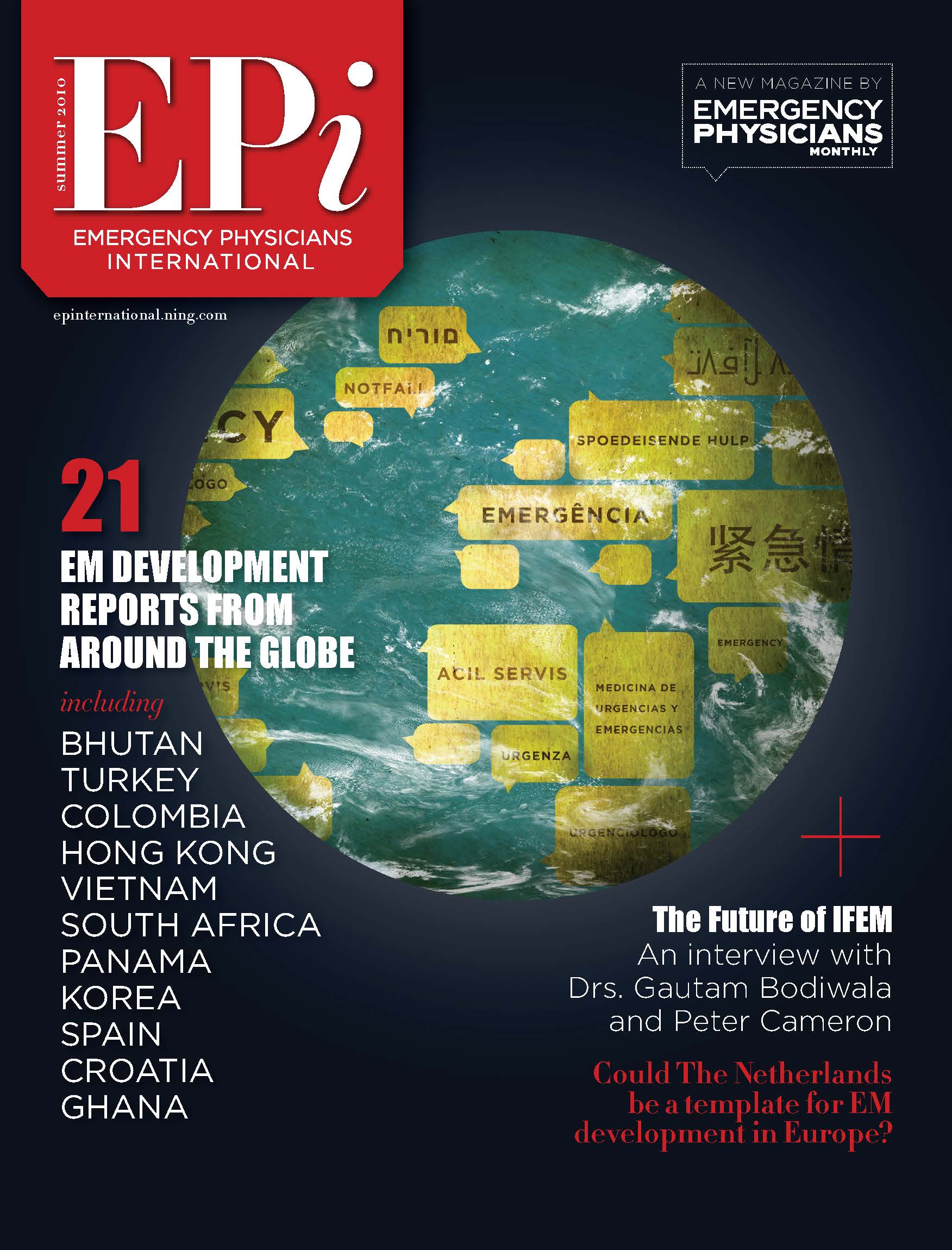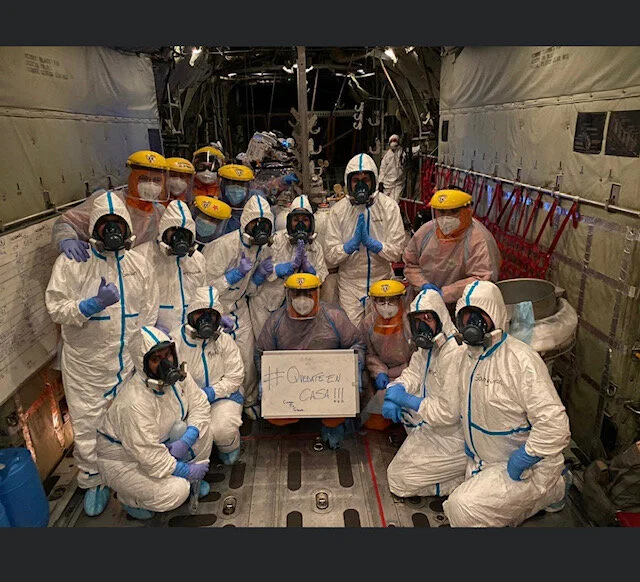From the DevelopingEM Archives: Dr. April Kam, Canada, July 2020
The following interview is presented in collaboration with DevelopingEM: A Conference with a Conscience. The interview was recorded last year, and published on July 12, 2020. The original publication can be seen on the DevelopingEM blog here. For an unedited transcription of the dialogue, please scroll below the video.
In the interview, Dr. April Kam offers insight to the unique circumstances of paediatric emergency medicine throughout the COVID-19 pandemic.
Mark Newcombe:
Hello, Developing EMers! Today, we're chatting with April Kam from Canada. April is a pediatric emergency physician and associate professor of pediatrics at McMaster university in Hamilton, Ontario. And she's been our paid EM track lead for Developing EM since 2016Her CVS massive, and I'm not getting any justice to all that she's achieved in Canada and the world. So I'll just say it's a pleasure to say her again and thank her ahead of time for squeezing in an interview with us at what is an amazingly busy, frenetic time. April, How you going?
April Kam: Doing great, Mark. We just celebrated Canada day. And you reminded me that you know, Australia is always ahead of the game with regards to time zone anyway, if nothing else. But we're, we're doing good here. Thanks.
Mark Newcombe: Good! A bit of that famous, nice Canadian humor there. It's always good to hear that. So I think originally you and your family had been aiming to spend a bit more time in Colombia after the conference. When did you get back home to Hamilton and what's the last three months been like at your place of work? Have you had to see icky, awful adult patients in your colorful claim pediatric department?
April Kam: So we went to Metagene after the conference ended and Cartagena, and we were so grateful to be able to see another part of a beautiful country. So really want to thank you. And Sanj for putting on another fantastic conference and everyone else that was on the organizing committee. We were lucky enough to have a flight booked back to Canada, to stay on March 17th. And it's been surreal back in Canada, just like everywhere else, you know, kids off to school. My partner, who is a family doc doing a lot of patient visits remotely. Yeah, but we haven't seen any adults yet in the pediatric ed. There there was a lot of talk about that back in March and there was even modules made for like adult emergency medicine, 101 for pediatricians who haven't seen kids since med school. So it got us a little concerned. But, but you know, that's not yet in the case for, for Canada
Mark Newcombe: In Texas and other places in the U S they were seeing adult patients in their Peds emergency departments, but not where you are.
April Kam: No yeah, no, not where we're at. Thankfully, you know, it's pretty quiet, low volume. This was our photos from Cartagena before social distancing was a thing. I don't know, Can you see it too? I know we were all very close together, a big group of us. But yeah. So, in terms of adults in the ED, not really yet. But we are seeing a lot of like way higher volume of just injuries in kids because kids are up, about, super active, which is great. I did a, like a national radio coast to coast kind of thing, going over just a bike safety, trampoline, you know, whether to have one or not, and things like that, they're all sold out. And, and just sort of reinforcing for parents, supervision when, of course they're juggling working from home and things like that. So in fact, Anthony Cracow and another physician in my ed had to go on also our national news kind of saying, telling people, "Hey, it's actually safe to come through the emerge. Please come, if you need to!" We had to like, actually kind of recruit, recruit patients almost.
Mark Newcombe: Right. So those all-terrain vehicles that are a bit of a nightmare, aren't they? You're seeing a bit of a spike in injuries related to that type of activity?
April Kam: Yeah, we are. We are, I mean, you guys might see a lot more of that in Australia and us as well with people going to the cottages or out in the country there was a big spike in ATV all-terrain vehicle accidents out west in Edmonton recently. So yeah, just making people aware that actually kids aren't supposed to be on those and definitely not driving them. So, yeah, that's, that's basically it.
Mark Newcombe: Honestly, I think it's almost the same for adults. We see so many bad injuries from those vehicles in all age groups. It's it's a wonder they're still allowed, but anyway, that's off topic. It's interesting to hear that the pandemic is having, you know, wide ranging effects that we didn't expect like trauma and other things in children. I guess back in March, we had an expectation that, you know, respiratory illness would predominate, perhaps kids wouldn't be as severely as affected as adults. What have you been experiencing in Ontario in regard to that, and how are things panning out with the respiratory side of this pandemic around the globe?
April Kam: Yeah, we haven't really been seeing many children with respiratory illnesses that were, that are actually requiring you know, aerosol generating medical procedures, like intubations or anything like that. These are our uh relatively recent COVID, our critical COVID-19 reports. And it's pretty, it's pretty low comparative, you know, compared to the US and and we're, it's not overwhelmed yet our ICU system, which, which is great. And like I said, we're not quite like Texas yet. But with regards to you know, kids and COVID this, there was a recent publication in Science about the contact patterns and in kids in, in COVID 19. And what they found interestingly is that kids were about a third as susceptible to Coronavirus as adults were, but when schools were open and, you know, they were out and hanging out with other people, they were about three times, they had about three times as many contacts as adults. And so therefore three times as many opportunities to become infected. And so essentially evening out their, their risk at the end of the day. Yeah,
Mark Newcombe: Interesting stuff, I guess in, you know, we've sort of been thinking more theoretically here about the types of treatment that we might give children for their respiratory illnesses. And there's been this huge amount of concern about the aerosol generating procedures, like nebulization high-flow, nasal CPAP and BiPAP as being just almost too high risk for the staff to allow them to occur. But that's what we've got in pediatric respiratory medicine, all of those things. And so, although you haven't seen a lot of cases, have you been trying to avoid those procedures and, and have you made any adjustments to how you'd manage respiratory patients at the moment?
April Kam: Yeah. So in anticipation of, of respiratory viral season, coming along all the pediatric EDS in Canada are planning basically a quality improvement trial or observation where we're going to be using epinephrin MDs or metered dose inhalers to treat moderate group as first-line instead of nebulized epinephrin. So it's they have it in British Columbia and in Alberta we've acquired it already at McMaster children's hospital. It's been approved by our REB. And yeah, it's just, it's almost, it's kind of taking it to the next step in terms of wanting to keep our staff safe. And so, but beyond that we're, we're still applying high flow C-PAP bi-pap intubating as, as indicated and using appropriate PPE when, when doing so
Mark Newcombe: Well, it's good to hear that because I, I think we just became extremely paranoid about these treatments, and I guess as long as we take the appropriate precautions, there's still going to be you know, the backbone of pediatric respiratory management. So it's great to hear that from you. I guess one of the less understood aspects of the pandemic and the illness back in March was that there was this vascular inflammatory nature of the whole illness in the last month or so there's been a lot of descriptions, case series, and other things coming out about the inflammatory conditions related to COVID-19. What can you tell us about this form of the illness and have you seen any cases and how should we be managing these patients, do you think?
April Kam: So, what what has transpired with regards to the Asian experience of COVID-19 has been on point, like we mentioned earlier with regards to much lower pediatric burden of disease overall, the surprising part is this temporal link of COVID-19 infection and, and these inflammatory syndrome syndromes that we don't have a great grasp on yet. So it re I think what we know is that it's a spectrum ranging from just fever and inflammation to, you know, what we know as Kawasaki disease to what is now named PD-- PIMS, or pediatric inflammatory multi-system syndrome, and the center for disease control, the world health organization CPSB, which is the Canadian branch and the RCPH which I think is British all, have their own individual definitions of, of, of it. So, but essentially they are all include children.
They all include, you know some length of fever with evidence of inflammation and the, and the fact that generally multi-system involvement you know, and excluding other causes. So there've been a handful of journal articles more and more coming out kind of every day outlining this which include cases of pediatrics. And so essentially the confusing or part might be, you know, what is the difference between Kawasaki and PIMS and what, in terms of summarizing all the studies that are out there? What, what is found is that PIMS tend to be in the slightly older age group than Kawasaki. Kawasaki tends to be like under five years or so. And PIMS is maybe more seven, eight um. Ethnicity wise, Kawasaki was generally more predominant in the Asian population, and PIMS more predominant in the Afro-Caribbean population, which might explain why it as evident back with in, in China, for example, when when COVID-19 was first, you know, first, where the first impact was.
Also, PIMS, there's more GI symptoms, so more diarrhea, vomiting, Abdo pain and and a much higher CRP and ferritin level. The two more recent publications were one in BMJ from France. And it was just observational, like most of these are, and kind of saying what I said earlier that that more, more commonly found in kids of African ancestry, more GI symptoms, more human dynamic instability, and maybe more cardiac involvement like myocarditus. And then this one fresh off the press in the new England journal of medicine published June 29th. This is of the, in the American cohort and what they found or what they looked at were you know, what, what laboratory findings there were. And it seemed to range depending on the age group, et cetera, but overall, you know, still higher CRP level slightly lower albumin and lympho cytopenia, and a neutrophilia.
Interestingly, their median duration of fever were, was about six days, no matter which, what age group. So that's a little higher than, than all the all the organizations were calling for. They were saying like three days of fever and more so it's reassuring, I think to us emerge docs. Cause we see kids, you know, with three days of fever all the time. So in that, in that sense sort of it was reassuring. So basically, yeah, like I said, PIMS or MIS or what you want to call it, basically a hyper inflammatory syndrome that is temporally related to COVID exists. And there's a wide spectrum of illness. And for us clinically, I think just knowing that we should be you know, noticing or taking note of these kids who are presenting with several days of fever and some inflammatory multi-system signs, they should get some lab work done. If, you know, if there are increases noticed with human dynamic, instability and changes, obviously you're admitting and treating regardless, but if it's just sort of laboratory changes, then they may be the cohort where you just sort of bring them back for a reassessment or something along those lines.
Mark Newcombe: Okay. It's a really fascinating insight. And you've given us here April on this evolving part of the pandemic. It's fine. Necessity, a bit of a quick rundown. So listeners, we're going to have some more information in the notes that are accompanying this video from April. I guess overall, what do you think the next 12 months look like, you know, in your department and in Canada in general in regard to the pandemic, the change in life that we've had everything.
April Kam: Yeah, I mean, I anticipate volumes in pediatric ATS will, will still be lower than normal for the coming few months. You know, combination of people being afraid to go out to a potentially more crowded area and area with sick people and things like that. And also with increasing availability of primary care physicians and providers that are doing virtual clinics and things like that. However in Canada right now, we're, we're in various stages of reopening up, you know right now restaurants, patios are open, opening up. So people are going out and eating Bird Kingdom and Niagara falls is opening up. People are doing things like that. So I mean it, depending on what happens with school come fall I'm anticipating probably the usual winter respiratory infection and volumes come January, February. And, and yeah, I think that's, what's going to happen.
Mark Newcombe: Well, you know, it's encouraging and we hope to remain encouraged, I guess as time goes forward and have things to look forward to just to let you know where we're still planning on going ahead with the 2022 conference with partners in Africa at this point in time, it looks like we might be in the Southern zone of Africa somewhere. And we'd really love it if you and your Canadian team could join us again. And you think that's going to be possible in a couple of years time?
April Kam: Yes. I can't wait yet for 2022 in so many ways! Developingem, Southern Africa. Yeah. Who knows what it'll look like? Maybe we'll all be in masks and two meters apart or, or maybe similar to the photos that we showed earlier with everyone. Just sort of yep. But I'm definitely a hundred percent onboard. Thank you, Mark.
Mark Newcombe: Awesome. Well, look, it's been awesome to chat with you. I'm glad you and your family are doing well and maybe we'll have another look at pediatric COVID in a few months time with you.
April Kam: Sounds good. Thanks, Mark!






